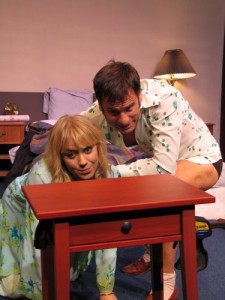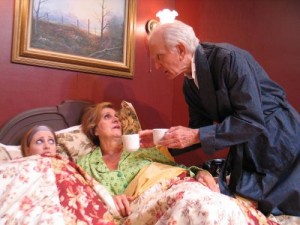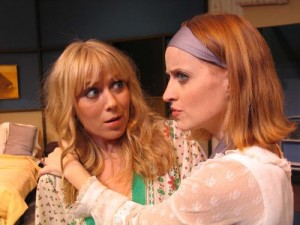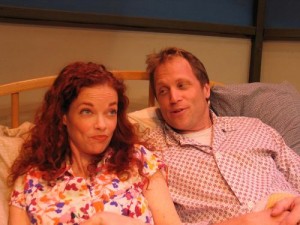WHEN A MARRIAGE GOES WRONG
Let’s not pull any punches. The Los Angeles critical community is under attack. And this reviewer is leading the charge against them.
Just as they admired en masse the woefully inadequate revival of Alan Ayckbourn’s How The Other Half Loves in Long Beach a few months ago, they have lavished praise upon the singularly unfunny revival of the same Mr. Ayckbourn’s Bedroom Farce at the Odyssey Theatre. They are clearly reviewing Ayckbourn’s reputation and not the productions they are seeing. And that is the best possible way to tarnish that reputation, not to mention the harm they do to Los Angeles theater and to the serious business of reviewing.
This Bedroom Farce seems not to have been understood at all, and, since not a single directorial opportunity has gone unmissed, not to have been directed at all. Despite the title, the play is not a farce. It would seem that when Tennessee Williams, in Cat On A Hot Tin Roof, had Big Mama say that when a marriage goes on the rocks, the trouble starts in the bed, Ayckbourn took that adage one step further and wrote what was a lacerating portrait of four marriages gone very much awry. The “farce” Ayckbourn is talking about is, in fact, a kind of tragedy. And Ayckbourn’s method is not to hit us over the head all at once but to slowly set up a situation in which his characters—who are very much real people worthy of psychological exploration—are revealed in all their human nakedness, and then set them spinning so that all their foibles become as hilariously funny as they are heartbreakingly true. It is a wonderful method and unique only in the way Chekhov’s “comedies” are unique. If one tries to inject farcical elements into the proceedings too early, we become less interested in the characters than in the situation. And, when the curtain falls at the end of the first act, instead of caring about what happens next to these clueless and vulnerable people, we leave the theater in a state of “who cares?”
Of course, even the set-up is drawn with wit and humor, and there are all sorts of comic possibilities inherent in this process, but this requires the actors to be at the top of their form, projecting physical dexterity with authentic behavioral tics, and a sense of belonging to different levels within the British class system. Ayckbourn is specific on matters of social situations, even if the results, on a human scale, are universal. But, as in too many of the Odyssey productions of British plays, the accents are phony and classless which can make their allegiance to British theater seem like nothing less than snobbery. If they are going to do plays like this or A Song at Twilight and get them so wrong, why not do American plays that are just as much worth doing and which stand a better chance at being done well? (It should be noted that one actor in this revival—Kate Hollinshead—is superb and, if you keep your eyes and ears on her, you’ll get a rough idea of how it should all be played; also, Maggie Peach is quite good, but she is in a totally different play than Robert Mandan, who plays her husband in an almost shockingly stupid display of farcical acting, although, in all fairness, Mandan does not stand alone in being inadequate to the demands of the play.)
 The following may seem like minor quibbles but they should be pointed out. If a man is told to keep his shoes off a bed, shouldn’t those shoes look as if they’ve seen some wear, some sense that street dirt clings to them, and not look as if the only place they’ve been is somewhere between the dressing room and the stage? If there is a pile of coats on a bed and all the guests leave at the same time, how can the host know which coat belongs to which guest so easily, especially when one character is forced to leave wearing someone else’s coat? If a bed-ridden character – with a bad back that renders him immobile – tries to get a book that is at the foot of the bed, shouldn’t we be laughing hysterically at the futile efforts he is making, instead of wishing he would get the damned bit of business over with as soon as possible? One could go on endlessly about such gaffes. And, when a single set requires no less than three bedrooms, all depicting three different ways of life, shouldn’t we, at the very least, expect an imaginatively conceived design rather than the ugliest set this reviewer can remember ever seeing in a professional production?
The following may seem like minor quibbles but they should be pointed out. If a man is told to keep his shoes off a bed, shouldn’t those shoes look as if they’ve seen some wear, some sense that street dirt clings to them, and not look as if the only place they’ve been is somewhere between the dressing room and the stage? If there is a pile of coats on a bed and all the guests leave at the same time, how can the host know which coat belongs to which guest so easily, especially when one character is forced to leave wearing someone else’s coat? If a bed-ridden character – with a bad back that renders him immobile – tries to get a book that is at the foot of the bed, shouldn’t we be laughing hysterically at the futile efforts he is making, instead of wishing he would get the damned bit of business over with as soon as possible? One could go on endlessly about such gaffes. And, when a single set requires no less than three bedrooms, all depicting three different ways of life, shouldn’t we, at the very least, expect an imaginatively conceived design rather than the ugliest set this reviewer can remember ever seeing in a professional production?
One’s instinct, after sitting through such an impossible bastardization of a fine play by a distinguished playwright, is to forget reviewing it altogether. But there is something bigger at stake here. This is not amateur theater. People are paying to see it. Everyone deserves better, and Alan Ayckbourn deserves much better. His Bedroom Farce has been turned into a farce, but not the farce Ayckbourn intended.
photos by Ron Sossi
Bedroom Farce
Odyssey Theatre Ensemble
2055 S. Sepulveda Blvd in West L.A.
Thurs-Sat at 8; Sun at 2 (check for additional performances)
ends on September 26, 2010
for tickets, call 310.477.2055 or visit Odyssey




